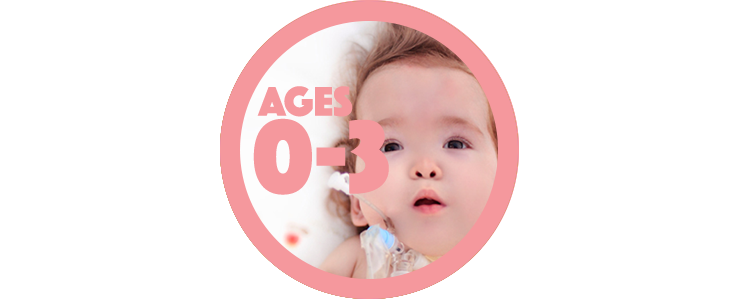Child development is a process of change. That process, or development, contributes to a child’s long term growth, feelings, and patterns of thinking over time.
Developmental changes tend to happen gradually and connect. This is usually called typical development. Human development takes many forms, and falls into three types, or domains.
- One domain is physical or biological growth.
- A second domain is cognitive growth, meaning thinking, reasoning and communication development.
- A third domain is psycho-social growth, meaning feelings, emotions and how an individual relates to others.
Oftentimes these developmental processes are referred to as “stages of development.” All children go through these stages of development as they grow and learn, and always in ways that are unique to the child. Ethnicity, culture, biology, environment and families influence a child’s development.
Development Guidelines
As a parent, you know your baby best. You notice things such as how and when your baby smiles, sits up, learns new words, walks, or holds a cup. What you are seeing is how your child is growing through different stages of development.
Every baby grows and develops at his or her own pace. It is important to talk with your child’s healthcare provider at every visit about the milestones your baby has reached and what to expect next. It is also important to tell your baby’s healthcare provider if you notice any of these signs of possible developmental delay. Please make sure to discuss your concerns if:
By age 2 months, your baby:
- Doesn’t respond to loud sounds
- Doesn’t watch things as they move
- Doesn’t smile at people
- Doesn’t bring hands to mouth
- Can’t hold head up when pushing up,when on tummy
- Doesn’t watch things as they move
- Doesn’t smile at people
- Can’t hold head steady
- Doesn’t coo or make sounds
- Doesn’t bring things to mouth
- Doesn’t push down with legs when feet are placed on a hard surface
- Has trouble moving one or both eyes in all directions
- Doesn’t try to get things that are in reach
- Shows no affection for caregivers
- Doesn’t respond to sounds around him or her
- Has difficulty getting things to mouth
- Seems very floppy
- Doesn’t make vowel sounds (such as “ah,” “eh,” “oh”)
- Doesn’t roll over in either direction
- Doesn’t laugh or make squealing sounds
- Seems very stiff, with tight muscles
- Doesn’t bear weight on legs with support
- Doesn’t sit with help
- Doesn’t babble (“mama,” “baba,” “dada”)
- Doesn’t play any games involving back-and-forth play
- Doesn’t respond to own name
- Doesn’t seem to recognize familiar people
- Doesn’t look where you point
- Doesn’t transfer toys from one hand to the other
The American Academy of Pediatrics recommends that all children be screened for general development at the 9 -month visit. Ask your child’s healthcare provider about your child’s developmental screening.
If you have concerns about your child’s development, you may also call the Family Health Hotline at 1-800-322-2588. This hotline can tell you about free developmental screening and other services, and give you the name of the Family Resources Coordinator (FRC) for your local area. The FRC can help you find out if your child needs further evaluation.
For More Information
For guidance and knowledge about stages of development and developmental milestones, visit:
To learn about typical development and what to do if you have concerns, read this birth to 6 pre-screening chart or call the Family Health Hotline at 1-800-322-2588.
For specific interest in children’s mental health view DSHS Children’s Behavioral Health.

